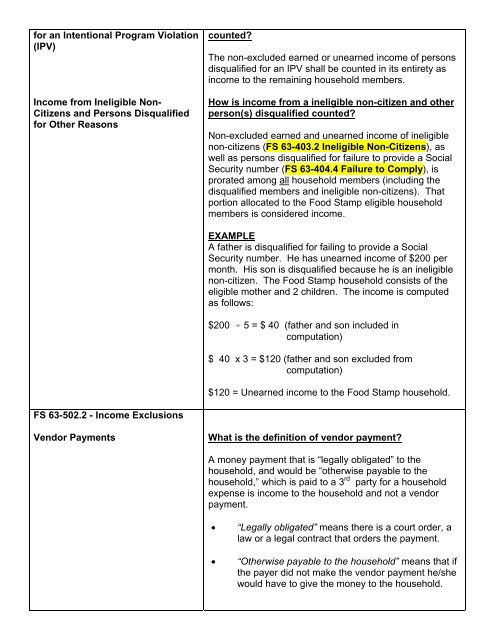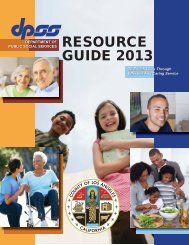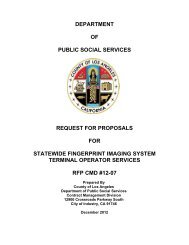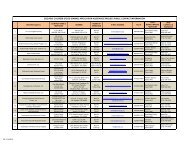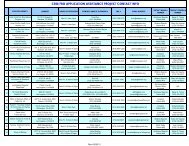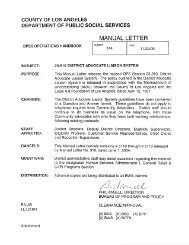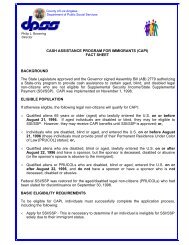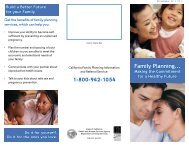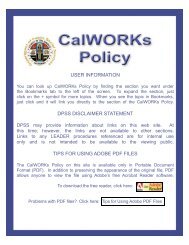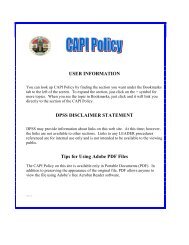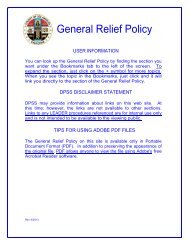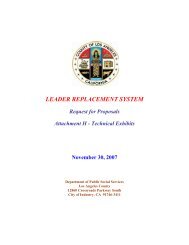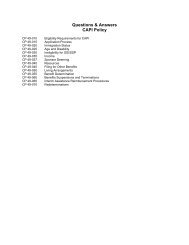FS 63-100 General Provisions - Department of Public Social Services
FS 63-100 General Provisions - Department of Public Social Services
FS 63-100 General Provisions - Department of Public Social Services
Create successful ePaper yourself
Turn your PDF publications into a flip-book with our unique Google optimized e-Paper software.
for an Intentional Program Violation<br />
(IPV)<br />
Income from Ineligible Non-<br />
Citizens and Persons Disqualified<br />
for Other Reasons<br />
counted?<br />
The non-excluded earned or unearned income <strong>of</strong> persons<br />
disqualified for an IPV shall be counted in its entirety as<br />
income to the remaining household members.<br />
How is income from a ineligible non-citizen and other<br />
person(s) disqualified counted?<br />
Non-excluded earned and unearned income <strong>of</strong> ineligible<br />
non-citizens (<strong>FS</strong> <strong>63</strong>-403.2 Ineligible Non-Citizens), as<br />
well as persons disqualified for failure to provide a <strong>Social</strong><br />
Security number (<strong>FS</strong> <strong>63</strong>-404.4 Failure to Comply), is<br />
prorated among all household members (including the<br />
disqualified members and ineligible non-citizens). That<br />
portion allocated to the Food Stamp eligible household<br />
members is considered income.<br />
EXAMPLE<br />
A father is disqualified for failing to provide a <strong>Social</strong><br />
Security number. He has unearned income <strong>of</strong> $200 per<br />
month. His son is disqualified because he is an ineligible<br />
non-citizen. The Food Stamp household consists <strong>of</strong> the<br />
eligible mother and 2 children. The income is computed<br />
as follows:<br />
$200 ) 5 = $ 40 (father and son included in<br />
computation)<br />
$ 40 x 3 = $120 (father and son excluded from<br />
computation)<br />
$120 = Unearned income to the Food Stamp household.<br />
<strong>FS</strong> <strong>63</strong>-502.2 - Income Exclusions<br />
Vendor Payments<br />
What is the definition <strong>of</strong> vendor payment?<br />
A money payment that is “legally obligated” to the<br />
household, and would be “otherwise payable to the<br />
household,” which is paid to a 3 rd party for a household<br />
expense is income to the household and not a vendor<br />
payment.<br />
• “Legally obligated” means there is a court order, a<br />
law or a legal contract that orders the payment.<br />
• “Otherwise payable to the household” means that if<br />
the payer did not make the vendor payment he/she<br />
would have to give the money to the household.


